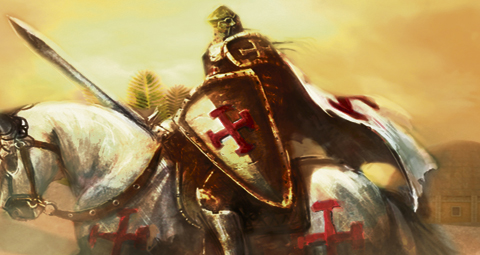March 30 | ![]() 2 COMMENTS
2 COMMENTS ![]() print
print

The time to fight for the future of our Faith
— The Church was globally beset by enemies at the time of the Knights Templar, as it is again today
By Gerald Warner
Seven hundred years ago this month, on March 22 1312, Pope Clement V dissolved the Order of Knights Templar by Apostolic Decree. The mythology of the Templars is an extraordinary phenomenon. No other organisation so long extinct has generated so much interest and controversy, more heated in the 21st century than at any period in the intervening 700 years. The most tenacious myth is that the Templars somehow contrived to survive in secret over many centuries. Today there are innumerable organisations that implausibly claim to be survivals of the Order of the Temple; there is even a degree of Knight Templar in Freemasonry.
The only group with credibility is a small religious order in Italy that models itself on the Templars, established with episcopal approval, and which uncharacteristically emphasises that it is not a survival of the original order but a new creation inspired by the Templars’ charism. Otherwise, the Dan Brown-style hokum prevails: secret treasures, esoteric rites and blasphemous interpretations of the New Testament are the stock in trade of the Templar industry. The fact that they ended up in conflict with the Church has lent the Templars a facile popularity and victim status among Catholicism’s enemies.
In the years leading up to their dissolution, 1307-12, the Templars were accused of every conceivable variety of heresy, vice and perversion. Were they guilty? It is fair to say that no group of men, however debauched, could possibly have committed all the faults and outrages attributed to them. It is also true that their accuser, King Philip the Fair of France, had a material motive in going to great lengths to discredit and convict them: he coveted their wealth. The use of torture rendered their confessions suspect. By the early 20th century even the Church, which had never been so implacably hostile to the Templars as Philip the Fair, tended to regard them as victims of a miscarriage of justice.
However, more modern scholarship of a strictly academic tenor, as distinct from internet conspiracy theorists, seems to be veering towards a less favourable view. Jonathan Riley-Smith, the leading expert on the Crusades, has pointed out that there were so many allegations, across Europe, of blasphemy against the Cross committed at their rites of reception of new knights that there was clearly something amiss. For any kind of sacrilege to be practised by a religious order is bizarre; the Templars had lived for generations in the Middle East and it is not impossible they had been tainted by some esoteric practices irreconcilable with Catholicism.
That does not convict them of the innumerable crimes attributed to them by their enemies, but it does suggest that the order was, at the least, in need of radical reform.
In Scotland, there were only two elderly Knights Templar in the country—Sir Walter de Clifton, the Preceptor of Balintradoch, and Sir William de Middleton—when they were put on trial in the Abbey of Holyrood in December, 1309 and acquitted. Prominent among their accusers were the St Clair family who, 150 years later, built Rosslyn Chapel; so the notion that the St Clairs were Templars and custodians of the order’s secrets is absurd, along with all the rest of the Da Vinci Code nonsense.
The most regrettable aspect of all the modern Templar flummery is that it obscures and distorts the significant contribution made to the Church and to Catholic civilisation by the Templars in their original incarnation, before the order became corrupted. They created the first religious Military Order, in itself an important development in the Church’s formulation of the concept of Christian armed struggle and the just war. St Bernard of Clairvaux, the Templars’ earliest champion, at the Council of Troyes in 1128 drew up the Rule of the order. Since then it has been clear that, given sufficient provocation and acting in self-defence, Catholics have every right to take up arms. The Crusades were an act of self-defence in favour of Christian pilgrims who, for centuries, had been harried and murdered by Muslims in the Holy Land.
Although a conflict such as the Second World War, fought against satanic Nazi tyranny, was self-evidently a just war, it did not have a specifically Catholic character. The most recent occasion on which the Church formally proclaimed a Crusade was the Spanish Civil War, when the Church was threatened with annihilation by atheistic Communism; the bishops of Spain declared it a Crusade.
Today, as the Church is globally beset by enemies ranging from militant Islamists to western secularists, the weapons that Catholics deploy are prayer, persuasion and political advocacy. At some time in the future, however, if the very existence of Catholicism is threatened, it is not inconceivable that recourse to arms might one day again become necessary.












A very interesting article. However, that last sentence said more than the many words preceding it. I find it astonishing that you call militant Islamists ‘enemies’, then proceed to declare that ‘recourse to arms might one day again become necessary’.
So in other words, you will be put to the sword if you do not respect the RC church. A very similar attitude to your Islamist enemies, don’t you think?
So in other words, you will be put to the sword if you do not respect the RC church. A very similar attitude to your Islamist enemies, don’t you think?
——————
That is not what Gerald Warner is saying, Simon.
Militant Islamists carry out terror attacks – in Nigeria etc – purely because they hate people who are not muslims. This is because they have been duped by preachers who pervert islam for their own ends. Such people see other as enemies purely because they are not Islamic.
Gerald does not advocate this view. His article is about robust defence of the faith; not attacks on people for being non-Catholic, or even for not respecting Catholicism. So, I cannot agree his attitude is similar to militant islamists at all.
Gerald is right that there are a range of enemies of the faith. These even include misguided Catholics, and those who portray themselves as Catholic in order to add weight to their criticisms of Catholicism.
Examples of these would include the Westminster ‘Catholic’ MPs, who recently wrote to the Pope to call for an end to clerical celibacy. A good example of fundamentally misguided Catholics whose actions cause harm.
Also, the Catholic press itself carries many duplicitous articles from so-called Catholic writers. This also causes harm. For example, in his February SCO article, Kevin McKenna says “Pity those who take a pope at the Pope”. Yet, in his latest Guardian article, the same Kevin McKenna calls the Church “a disgrace” and demands Catholics withhold their financial support of the Church (which would ultimately lead to…….no Church).
Comparing Gerald Warners sentiments to those of Kevin McKenna and the Catholic MPs, It is not difficult to see which of the three examples represents the more genuine and faithful Catholicism.
Interesting too, that Gerald, the orthodox Catholic, is the only party of the three whose opinions are not directly linked to his own financial gain (McKenna), or perceived status (the MPs).